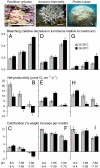Ocean acidification causes bleaching and productivity loss in coral reef builders
- PMID: 18988740
- PMCID: PMC2580748
- DOI: 10.1073/pnas.0804478105
Ocean acidification causes bleaching and productivity loss in coral reef builders
Abstract
Ocean acidification represents a key threat to coral reefs by reducing the calcification rate of framework builders. In addition, acidification is likely to affect the relationship between corals and their symbiotic dinoflagellates and the productivity of this association. However, little is known about how acidification impacts on the physiology of reef builders and how acidification interacts with warming. Here, we report on an 8-week study that compared bleaching, productivity, and calcification responses of crustose coralline algae (CCA) and branching (Acropora) and massive (Porites) coral species in response to acidification and warming. Using a 30-tank experimental system, we manipulated CO(2) levels to simulate doubling and three- to fourfold increases [Intergovernmental Panel on Climate Change (IPCC) projection categories IV and VI] relative to present-day levels under cool and warm scenarios. Results indicated that high CO(2) is a bleaching agent for corals and CCA under high irradiance, acting synergistically with warming to lower thermal bleaching thresholds. We propose that CO(2) induces bleaching via its impact on photoprotective mechanisms of the photosystems. Overall, acidification impacted more strongly on bleaching and productivity than on calcification. Interestingly, the intermediate, warm CO(2) scenario led to a 30% increase in productivity in Acropora, whereas high CO(2) lead to zero productivity in both corals. CCA were most sensitive to acidification, with high CO(2) leading to negative productivity and high rates of net dissolution. Our findings suggest that sensitive reef-building species such as CCA may be pushed beyond their thresholds for growth and survival within the next few decades whereas corals will show delayed and mixed responses.
Conflict of interest statement
The authors declare no conflict of interest.
Figures

Similar articles
-
The reef-building coral Siderastrea siderea exhibits parabolic responses to ocean acidification and warming.Proc Biol Sci. 2014 Dec 22;281(1797):20141856. doi: 10.1098/rspb.2014.1856. Proc Biol Sci. 2014. PMID: 25377455 Free PMC article.
-
Future reef decalcification under a business-as-usual CO2 emission scenario.Proc Natl Acad Sci U S A. 2013 Sep 17;110(38):15342-7. doi: 10.1073/pnas.1302701110. Epub 2013 Sep 3. Proc Natl Acad Sci U S A. 2013. PMID: 24003127 Free PMC article.
-
Sponge erosion under acidification and warming scenarios: differential impacts on living and dead coral.Glob Chang Biol. 2015 Nov;21(11):4006-20. doi: 10.1111/gcb.13002. Epub 2015 Sep 29. Glob Chang Biol. 2015. PMID: 26087148
-
Projecting coral reef futures under global warming and ocean acidification.Science. 2011 Jul 22;333(6041):418-22. doi: 10.1126/science.1204794. Science. 2011. PMID: 21778392 Review.
-
Coral reefs under rapid climate change and ocean acidification.Science. 2007 Dec 14;318(5857):1737-42. doi: 10.1126/science.1152509. Science. 2007. PMID: 18079392 Review.
Cited by
-
What is the evidence for the impact of ocean warming on subtropical and temperate corals and coral reefs? A systematic map.Environ Evid. 2024 Nov 21;13(1):25. doi: 10.1186/s13750-024-00349-y. Environ Evid. 2024. PMID: 39568058 Free PMC article.
-
Effects of water flow and ocean acidification on oxygen and pH gradients in coral boundary layer.Sci Rep. 2024 Jun 4;14(1):12757. doi: 10.1038/s41598-024-63210-9. Sci Rep. 2024. PMID: 38830941 Free PMC article.
-
Lipid Droplets in Endosymbiotic Symbiodiniaceae spp. Associated with Corals.Plants (Basel). 2024 Mar 25;13(7):949. doi: 10.3390/plants13070949. Plants (Basel). 2024. PMID: 38611478 Free PMC article. Review.
-
Insulin signaling and pharmacology in humans and in corals.PeerJ. 2024 Jan 31;12:e16804. doi: 10.7717/peerj.16804. eCollection 2024. PeerJ. 2024. PMID: 38313028 Free PMC article.
-
Evaluating the effects of climate change and chemical, physical, and biological stressors on nearshore coral reefs: A case study in the Great Barrier Reef, Australia.Integr Environ Assess Manag. 2024 Mar;20(2):401-418. doi: 10.1002/ieam.4871. Epub 2023 Dec 20. Integr Environ Assess Manag. 2024. PMID: 38018499
References
-
- Hoegh-Guldberg O, et al. Coral reefs under rapid climate change and ocean acidification. Science. 2007;318:1737–1742. - PubMed
-
- Hoegh-Guldberg O. Climate change, coral bleaching and the future of the world's coral reefs. Mar Freshw Res. 1999;50:839–866.
-
- Caldeira K, Wickett ME. Anthropogenic carbon and ocean pH. Nature. 2003;425:365. - PubMed
-
- Sabine CL, et al. The oceanic sink for anthropogenic CO2. Science. 2004;305:367–371. - PubMed
-
- Kleypas JA, Langdon C. Coral Reefs and Climate Change: Science and Management. Vol. 61. Washington DC: AGU Monograph Series, Coastal and Estuarine Studies, Am. Geophys. Union; 2006. Coral reefs and changing seawater chemistry; pp. 73–110.
Publication types
MeSH terms
Substances
LinkOut - more resources
Full Text Sources
Other Literature Sources


